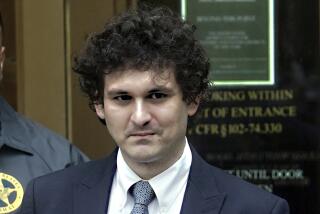Lawmaker says SEC hindering House’s Madoff probe
- Share via
WASHINGTON — The investigator whose repeated warnings about Bernard Madoff were ignored by the Securities and Exchange Commission called Wednesday for an overhaul of the agency, charging that many officials don’t understand the complexities of the markets they’re supposed to police.
In his first public testimony since Madoff was arrested Dec. 11 on charges of running a Ponzi scheme, Harry Markopolos also said that he and other investigators feared for their safety as they gathered information against Madoff, once one of Wall Street’s most powerful players. They reasoned that anyone facing life in prison might be desperate enough to try to hurt them.
Markopolos, a professional financial-fraud investigator, said that if the SEC had acted on his suspicions when he first raised them in 2000, thousands of investors might have been spared and the alleged scam might have never reached the $50 billion in potential investor losses.
“We knew then that we had provided enough red flags and mathematical proof to the SEC where they should have been able to shut him down, right then and there, at under $7 billion,” Markopolos told a House Financial Services subcommittee. “But, unfortunately, the SEC staff lacks the financial expertise and is incapable of understanding the complex financial instruments being traded in the 21st century.”
Markopolos described an agency that had few investigators with real-world experience in the financial markets. Thus, even the most obvious signs that something might be amiss with Madoff’s operation failed to raise eyebrows, he said.
For instance, Markopolos said he realized within five minutes of looking at a document containing Madoff’s supposed performance results that something was seriously wrong. A Madoff chart showed his investment returns going upward in an improbably straight line.
“It was a 45-degree angle, without any variation,” Markopolos said. “It went in only one direction, up. It never had variation like the market does. And that was the key tip-off.”
But Markopolos and his small group of investigators, composed of financial market experts who conducted their investigation at their own expense, went beyond their hunches, uncovering evidence to back up their suspicions.
Markopolos and lawmakers at Wednesday’s hearing reached the same conclusion: The SEC, with its vastly superior resources, should have been able to do at least as well as Markopolos’ team.
The problem with federal oversight of the financial markets went beyond the SEC, said Markopolos. He blamed the division of oversight between the SEC and the Commodity Futures Trading Commission for allowing Madoff to fall through the cracks.
Markopolos joined the growing chorus of SEC critics calling for the creation of a “super regulator” to link the efforts of existing agencies.
Markopolos also blamed the agency’s tendency to defer to big Wall Street players for their mostly hands-off attitude toward Madoff.
“Madoff was one of the most powerful men on Wall Street,” Markopolos said. “He owned a prestigious brokerage firm. He and his brother held numerous top-level positions on the most influential industry association boards. Clearly, the SEC was afraid of Mr. Madoff.”
Madoff remains out of jail, living in his Upper East Side Manhattan apartment as prosecutors continue to probe the massive alleged financial fraud and prepare their legal case.
While Madoff is now an object of contempt for many investors who lost money, Markopolos said he once feared that he and his investigators might be targeted by Madoff himself.
“Madoff was already facing life in prison if he were caught, so he’d face little to no downside to removing whatever threats he felt we posed,” Markopolos said. “At various points in time throughout these past nine years, each of us feared for our lives. Each time any of us collected information, we took risks and fortunately for us, we were not discovered.”
--
More to Read
Sign up for Essential California
The most important California stories and recommendations in your inbox every morning.
You may occasionally receive promotional content from the Los Angeles Times.










